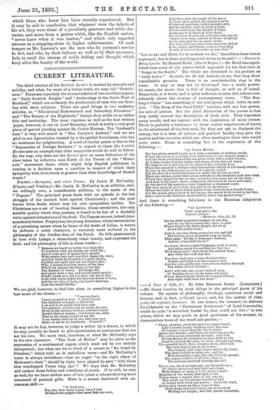POETBY. — Serapion, and other Poems. By Justin H. McCarthy. (Chatto and
Windus.)—Mr. Justin H. McCarthy is an addition, and, we willingly own, a considerable addition, to the ranks of the 4' Pagans." The principal poem deals with an episode in the last straggle of the ancient faith against Christianity ; and the poet leaves little- doubt which way his own sympathies incline. His Christians are a set of howling fanatics, whose asceticism, the only notable quality which they possess, is found to be but of a doubtful value against temptations of the flesh. The Pagans are not, indeed, trail. ecendently better. Porphyries, the young Athenian, whose renunciation of a promising career when he hears of the death of Julian, is meant to indicate a noble character, is certainly more inclined to the philosophy of the Garden than of the Porch. He falls passionately in love with Lalage, a shamelessly venal beauty, and expresses his faith and his philosophy of life in these words :— " Because we know no better way than this To brighten with all beauty our brief life; And if some girl of Aphrodite's mould, With tender hair and eyes that shame the stars,
And fair limbs fashioned for a god's desire, Gladden our sight and set our hearts afire : Why, I should hold him basest of the base Who'd lay against the kisses of her lips The Empery of Cesar. All things die, And glory lasts a day, and proud names perish ; Bright youth goes out too soon, but ere it flies Seize with warm hands the blossom flower of love,
And for one kiss of hers, one hour's embrace, Lose the world lightly."
We are glad, however, to find him risen to something higher in the last scene of the drama :—
"I am resolved I have no portion here : I cannot toad The Galilean triumph, so farewell!
I am not to be pitied that have seen The greatest, noblest soul on earth, the last Made in the antique fashion, and have loved Barth's fairest woman; and believe me, lady, That to the latest second of my life Your beauty shall be by me, and your eyes Shine on me in my loneliness. Farewell!"
It may not be fair, however, to judge a writer by a drama, in which he may possibly be found to give prominence to sentiments that are not his own. We must look, therefore, at what Mr. McCarthy says in his own character. "The Gods of Hellas" may be taken as the expression of a sentimental regret, which must not be too strictly interpreted ; but what are we to think of a sonnet to "An Angel by Cimabne," which tells us in melodious verse—and Mr. McCarthy's verse is always melodious—that an angel "at the right elbow of Madonna's chair" should by right have played its part "with those that worshipped Venus long ago "? We hope that Mr. McCarthy will eschew these follies and rebellions of youth. If he will, be may as well, for we have seldom seen of late years a volume showing more command of poetical gifts. Here is a sonnet fashioned with un- common skill :— "A GARLAND.
For you, how many a posy have I tied
Of blood-red poppies that must fade too soon,
Pale lilies with the magic of the moan In their white petals, the imperial pride Of starred narcissus, violets purple-eyed, Sad by-mit:thus with its written rune, All-coloured roses the delight of June, Anemanes with blood of Adon dyed!
For all these flowers the self-same tale repeat, ` Learn to be wise, and let no flower of spring Go by unheeded for its odour sweet ; For soon chill age and conquering time defeat Love, youth, and beauty, even as they fling A ruin of marred blossoms at your feet."'


































 Previous page
Previous page